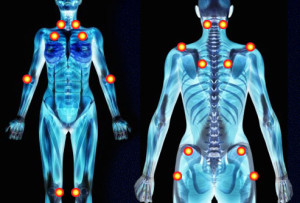
- physical or emotional trauma
- sleep disturbances
- infection (possibly viral or fungal)
- allergies or chemical sensitivities
- alterations in neurotransmitter activities
- nutritional deficiencies
Signs and symptoms of FM may vary, although pain is the most prevalent and common. Weather, stress, anxiety or physical exertion may exacerbate FM. In addition to pain with FM, you may also experience:
- anxiety
- chest pain
- depression
- irritable bowel syndrome (IBS)
- memory and concentration challenges
- dizziness
- dry eyes, skin and mouth
- numbness and tingling in your hands and feet
- heart palpitations
- tension or migraine headaches
- sleep disturbance
- painful menstruation
To be diagnosed with FM by your doctor, you need to have had pain for at least three months in at least 11 of 18 specific tender points such as those listed above. Blood and urine tests usually show nothing specific to indicate FM, but your doctor may request them to rule out any underlying condition.
Your doctor will likely prescribe pain medication and an exercise program such as yoga, along with methods of relaxation such as massage therapy. Drugs prescribed usually include muscle relaxants, anti-inflammatories, and pain relievers. Anti-seizure drugs and/or antidepressants may be called for as well.
Diet modification, such as the elimination of caffeine, sugar, and processed foods can be of great help if you are suffering from FM. Acupuncture and TCM may help reduce your pain as well as your stress.
Contact us for a FREE consultation on how natural therapy can help you manage fibromyalgia.
These links may also be helpful:
Acupuncture Relief for Knee Pain







